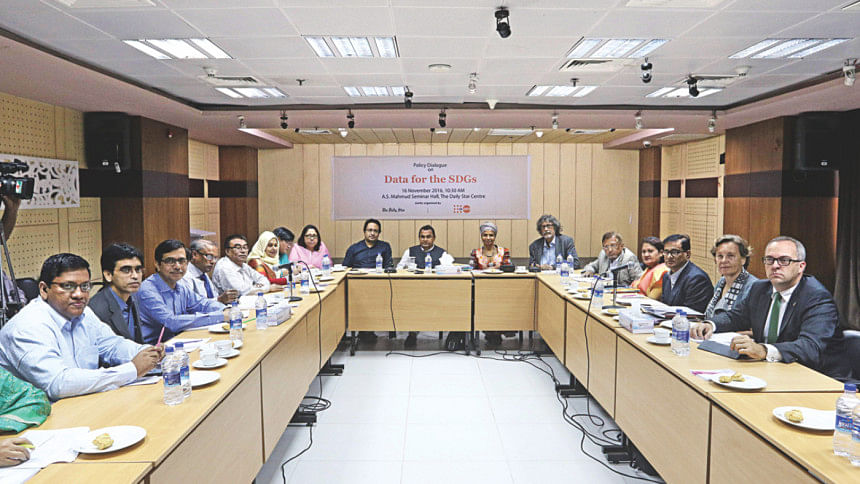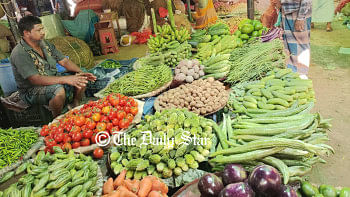Bangladesh will be number one SDG achiever

Bangladesh will be the number one in achieving UN's Sustainable Development Goals (SDGs) by 2030, Planning Minister AHM Mustafa Kamal said yesterday.
“We are now in the preparation phase. We will come out number one in implementing SDGs,” he said while addressing a discussion on “Data for the SDGs”.
The United Nations Population Fund (UNFPA) and The Daily Star jointly organised it at the latter's conference hall in the capital.
Mustafa Kamal said hardcore poverty in Bangladesh came down to 12.9 percent now from 25.1 percent in 2005, and it would be 3.5 percent by 2030.
“We want to see all people of the country to have good food and access to health and education.”
Around 5.6 million people still remain marginalised, he said, adding, “If we leave them behind and don't bring them to the mainstream, our economic growth will be subject to criticism.”
With the progress made by Bangladesh in the regime of Millennium Development Goals (MDGs) in last 15 years, the country's development has gained new momentum, the minister said.
According to a report on the 2015 progress report on MDGs, Bangladesh progressed in poverty alleviation, food security, primary school enrolment, gender parity in primary and secondary education, immunisation coverage, and reductions in infant, under-five and maternal mortality, and prevalence of communicable diseases.
However, existence of poverty pockets, unemployment among the youth, stunting and wasting among the under five children, high dropout rate, and improving quality of primary education, universal access to reproductive health and resource remain as major challenges.
In late 2015, the UN adapted SDGs for the next 15 years to consolidate the developments achieved and make development sustainable. SDGs' main principle is “Leaving None Behind”, which means the focus is on the hard-to-reach, hidden, marginalised, and vulnerable population and on geographical disparities. SDGs have 17 goals, 169 targets, and 230 indicators.
Prof Shamsul Alam, member of the general economics division at the Planning Commission, said Bangladesh would implement SDGs through the country's national five-year plans.
But his concern is “many of the SDG indicators are not clear”. New data need to be generated to measure over 100 indicators, and it is a big task for the government, he said.
Prof Alam suggested that the Bangladesh Bureau of Statistics (BBS) increase the frequency of surveys like the household income and expenditure survey and labour force survey. BBS should use multidimensional poverty index method that includes peoples' food consumption, housing, health and education status in measuring poverty level, instead of consumption-based measure of poverty, he said.
UNFPA's Bangladesh Country Representative Argentina Matavel Piccin said data would play a critical role in understanding who actually were now left behind and their needs.
Data for men and women, rural and urban or different age groups need to be disaggregated for the authorities to understand and take development interventions, she said.
While generating data is important, its analysis and utilisation is even more important, she added.
Swedish Ambassador Johan Frissel said each country would have to generate data based on its needs, but could surely align its plan based on SDGs.
For example, he said, Bangladesh had five-year plans and the visions of 2021 and 2041, but no plan for 2030. Having perspectives of SDGs and including national policies accordingly will be helpful as much of the global funding will be based on SDGs, he said.
Rushidan Islam Rahman, research director of the Bangladesh Institute of Development Studies, suggested that BBS partner with other research organisations to improve quality of its data and analysis.
UNDP official Fakhrul Hasan recommended the same.
UNFPA official Mahbub E Alam and General Economics Division Deputy Chief Monirul Islam made presentations, while Members of Parliament Selina Begum and Nurjahan Begum, UN Women Country Representative Christine Hunter, BBS Director General MA Wazed, Dhaka University's Prof Mahbuba Nasreen, Population Council Country Director Ubaidur Rob, CPD Research Fellow Towfiqul Islam Khan, and The Daily Star Special Supplement Editor Shahnoor Wahid also spoke at the discussion moderated by public health expert Shamim Ahmed.

 For all latest news, follow The Daily Star's Google News channel.
For all latest news, follow The Daily Star's Google News channel. 



Comments